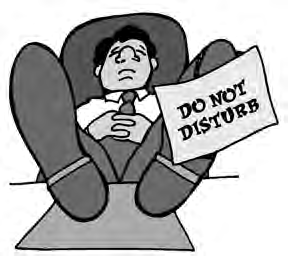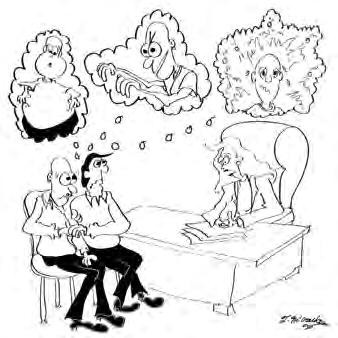100 Perks of Having Cancer: Plus 100 Health Tips for Surviving It (34 page)
Read 100 Perks of Having Cancer: Plus 100 Health Tips for Surviving It Online
Authors: Florence Strang
Tags: #Health; Fitness & Dieting, #Diseases & Physical Ailments, #Internal Medicine, #Oncology, #Cancer, #Medicine & Health Sciences, #Clinical, #Medical Books, #Alternative Medicine, #Medicine

need for their care. Everyone gets angry now and then, but if you can’t con-
trol the anger, and you find yourself pointing fingers at your doctors and
their staff, you may want to examine your feelings. Anger can stem from a
sense of losing control and may lead to the need to control your caregivers.
Aggressive patients are the drivers with road rage, and often everyone just
gets out of their way.
If you answered (c), you are the assertive patient.
Assertive patients are
outspoken without being rude. They are very involved in their care, know
134
100 Perks of Having Cancer
all their medications, and are active participants in their treatment plan.
They have taken control of their health and have meaningful conversations
with their healthcare providers about their treatment course. They ask ques-
tions and therefore get better and more pertinent information. Assertive
patients actually have better treatment outcomes with fewer
negative side effects. They are in the driver’s seat, and they
Take charge of your
are responsible for setting the navigation system to take
health and your health
them where they want to go.
care to make a positive
impact on your health
Dr. Bernie Siegel, a celebrated author who was named
and your life.
one of the “Top 20 Spiritually Influential Living People on
the Planet” in 2011, has been teaching survival behavior for
decades. Dr. Siegel not only is an advocate for patient assertiveness, but he
has written books on the miraculous results that being assertive has had on
patients. Dr. Siegel states:
The word “patient” derives its meaning from submissive sufferer. That
is not a good thing to be when hospitalized or receiving medical treat-
ment of any kind. You need to be a respant, or responsible participant,
if you want to heal and survive.
So . . . are you a patient? Or a respant? The choice is yours.




Perk #34
Sleeping In
B
eing an early riser by nature, I prided myself on the ability to get by
with very little sleep. There always seemed to be so many things to do,
and so little time to do them! Who had time for sleep? But after cancer, I
rested as much as I felt my body needed it. According to Susan, getting the
right amount of sleep is absolutely necessary for good health, so I had noth-
ing to feel guilty about. In fact, even now, getting plenty of sleep is an impor-
tant part of my survival plan. Ah, it feels great to roll over, look at the clock,
and slip back into a deep and guilt-free sleep!
Listen to your body. If it tells you to sleep, just do it.
HEALTH TIP #34
The Art of Napping
S
leep is essential for good health. But does that include the thirty-minute
snooze that you steal under your work desk at three o’clock in the after-
noon? According to Harvard Medical School, the answer is yes.
If you are like the majority of working 9-to-5
people, your body’s natural rhythm reaches a lull
between 2:00 and 4:00 PM. This is the period of
time when you feel you are dragging to get through
the rest of the day, which leads some of us down
the hall to get some coffee, do an “energy shot,” or
worse, grab a candy bar. But it turns out that nap-
ping may be the healthy answer.
A recent British study compared different ways
of making it through the afternoon snooozies: either
I 135 J
136
100 Perks of Having Cancer
by getting more nighttime sleep, by drinking caffeine, or by taking a nap.
The most effective way to make it through the day was the nap.
Harvard researchers have found that naps can improve memory, enhance
learning, and spark creativity. Studies performed at NASA on pilots and
astronauts showed an improved performance of 34 percent after napping,
and 100 percent enhanced alertness. The science is so strong on this issue,
that sleep researchers even advocate having policies that encourage napping
at work. For example, at the Google headquarters, nap pods are placed
strategically among their workspaces. The pods look like huge ice cream
scoops. Putting your head in the “scoop” blocks out sound and light so you
can catch some serious Z’s. Some other employers that let their employees
sleep on the job are Ben & Jerry’s, Nike, Pizza Hut, and British Airways.
Instead of the employees abusing their “rest rooms,” it has actually increased
productivity and employee satisfaction.
The longer you are awake, the less likely it will be for your brain to retain
information. Napping resets the clock, so to speak, and your alertness is
restored for a little while longer.
Getting some extra sleep seems to be especially important to those who
work nights. In one study, air traffic controllers on the night shift were far
more alert after taking a forty-minute nap, and it has been recommended
to firefighters working the night shift that they take an extra nap in the late
afternoon right before they start work to help with concentration and
fatigue.
I would probably check with your employer first before settling in for your
daily siesta. But if it’s something that you are able to do, here are some tips:
●
Try to get twenty to thirty minutes of sleep. Any more than that might
have a negative effect of feeling groggy. Even a few minutes of sleep has
been shown to help.
●
Take your naptime in a quiet, cool, dark place if possible, to reduce the
amount of time you spend falling asleep.
●
If you plan to take a nap at 2 PM, don’t have coffee at lunch. Caffeine
takes some time to have an effect on your energy level and might sabotage
your sleep.
Perk #34: Sleeping In
137
●
Don’t nap after 4 PM or it might interfere with your usual night’s sleep.
●
If you plan to nap in the afternoon, include lunchtime foods that contain
tryptophan, a food chemical that promotes relaxation. Some of these
foods include pumpkin seeds, greens like spinach, turnip greens, and
watercress, white and crimini mushrooms, and asparagus.
●
Shake the stigma that people who nap are lazy. You’re not lazy; you’re
smart!
Contrary to what you may have been told, taking a nap before 4 PM will
not affect your ability to get a good night’s sleep that night. For example, if
you have trouble falling asleep usually, it will be no different
whether you nap or not and the same goes for good sleepers.
And while getting eight to ten hours of continuous sleep is the
To combat fatigue
best routine for your health, napping has been shown to
during the day,
improve general health and reduce risk of heart problems in
consider taking an
all types of sleepers.
afternoon snooze.
The next time afternoon fatigue starts to set in, instead of
reaching for the caffeine, reach for the pillow and eyeshades. You’ll wake
up refreshed and ready to tackle the rest of the day!
For more information on sleep, visit the National Sleep Foundation at
www.sleepfoundation.org.



